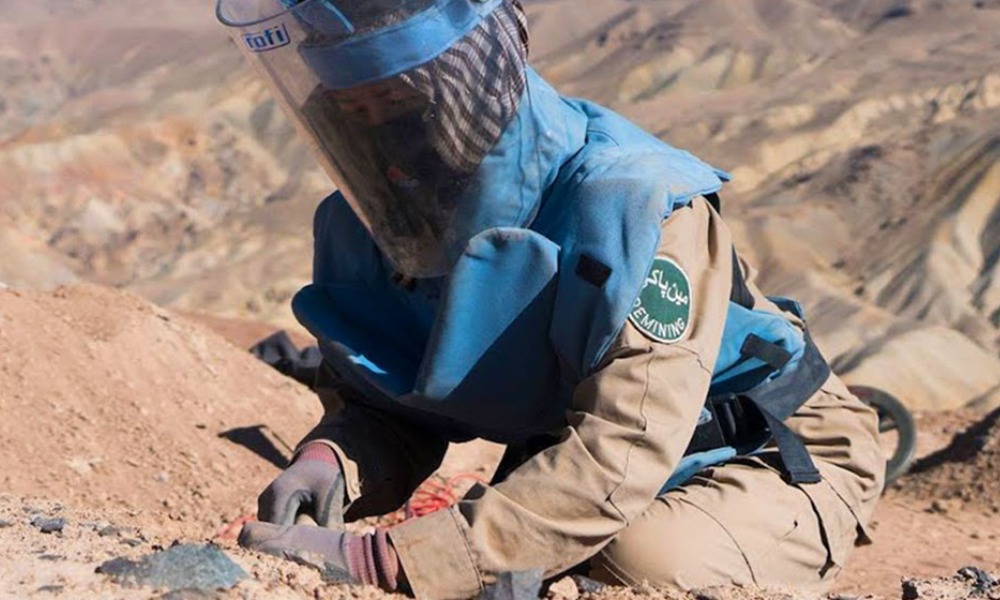Latest News
Afghan woman putting her life at risk to rid her home of mines

The UK Embassy in Kabul says that over 1.6 million Afghans have received mine risk education and more than 30 km2 of productive land have been also cleared of mines and unexploded ordnance (UXOs) in the last three years to save lives and promote agriculture.
Marking the Mine Awareness Day, the British Embassy stated with the UK has been providing support to United Nations Mine Action Service (UNMAS) in the last three years, aimed at helping the war-torn country manage mine clearance operations.
Fezeh Rezaye, a 26-year-old mother of two, is a member of a 19-strong, all-female demining team, honored for their efforts by the Arms Control Association, which awarded them the Arms Control Person International Award in 2019.
Rezaye explains that how a tragic incident led her to put aside her ambition to be a teacher, and take up a risky demining job instead.
“I had known several people from my village who have been injured or killed by mines in Bamyan. Even our landlord lost his leg in a landmine accident. But it was the death of seven children, all from the same family in our village that really affected me. They had been together in the mountains when they were all killed by a mine explosion. I thought about my own children, that this could have happened to them,” said Rezaye.
Before joining demining team Rezaye was teaching literacy to rural women in Bamyan province. She says that everyone including his family disagreed with her decision to become a deminer.
“My friends and family, including my children, disagreed with my decision to become a deminer. I would tell them that, for the sake of my future and for my children, I wanted Bamyan to be free from mines so that everyone can study and enjoy life,” Rezaye said.
Most families in Afghanistan look at this job as dangerous and risky work and are not welling their daughter’s life.
Rezaye also speaks about threats and challenges against her job in the country.
“I am concerned about my job security because, once these are cleared, I may not be able to work in other provinces, many of which are dominated by the Taliban,” said Rezaye.
Rezaye says that she is also interested in completing a master’s in sociology or archaeology.
Rezaye and her female demining team were the first female deminers team in Afghanistan.
“Winning the Arms Control Award made a big difference for me and the team. After we won, we were recognized by Afghan society and became idols for many women. We were the first female demining team in Afghanistan, and we proved that women can work as hard as men, that we are equal to them, she added.
More than three decades of armed conflict in Afghanistan has left a sorry legacy, with mines, and other explosive remnants of war, contaminating the country. Since 1989, the Mine Action Programme of Afghanistan (MAPA) has been working to clear this dangerous material but, with the conflict still ongoing, some 120 civilian mine-related casualties are recorded every month, and it is considered unlikely that the target of declaring the country free from mines will be reached.
Although explosive remnants of war remain on some firing ranges, Bamyan was declared mine-free since 2019, making it the first mine-free province in Afghanistan, following years of demining work that saw explosive devices removed from some 27,012,116 square meters of contaminated land with explosive devices.
But, in general, Bamyan society is more open than other parts of the country: this is a poor province, with high unemployment, and demining is one of the few opportunities for women to earn money.
As of 2020, Afghanistan is one of the countries most affected by landmines and explosive remnants of war (ERW) in the world. Around 32,000 hazardous areas have been cleared or otherwise canceled since 1989, yet some 1,495 communities remain affected by explosive ordnance (EO) to this day.
Over 38,000 explosive ordnance casualties have been recorded since 1979 (2,090 women, 2,322 girls, 14,646 boys, 19,590 men) of which almost 10,000 resulted in death and more than 29,000 in injuries.
In recent years, improvised explosive devices (IEDs) have become one of the leading causes of civilian casualties in the country.
In 2019 alone, explosive ordnance contamination resulted in 1,692 casualties (143 girls, 122 women, 716 boys, 711 men), resulting in 650 deaths and 1,042 injured victims. The accidents were almost entirely caused by ERW and improvised mines (IM).
Men and boys tend to be killed and injured at a far higher rate than women and girls. Numbers for all groups at least doubled in 2014-2019 compared to 2008-2013, largely due to a sharp increase in IM casualties.
Latest News
Dozens of U.S. lawmakers oppose Afghan immigration freeze after Washington shooting

Sixty-one members of the U.S. Congress have urged the Trump administration to reverse its decision to halt immigration processing for Afghan nationals, warning that the move unfairly targets Afghan nationals following a deadly shooting involving two National Guard members.
In a letter addressed to Secretary of State Marco Rubio and Homeland Security Secretary Kristi Noem, the lawmakers said the incident should not be used to vilify Afghans who are legally seeking entry into the United States. They stressed that Afghan applicants undergo extensive vetting involving multiple U.S. security agencies.
The letter criticized the suspension of Special Immigrant Visa processing, the termination of Temporary Protected Status for Afghanistan, and broader travel and asylum restrictions, warning that such policies endanger Afghan allies who supported U.S. forces during the war.
“Exploiting this tragedy to sow division and inflame fear will not make America safer. Abandoning those who made the courageous choice to stand beside us signals to those we may need as allies in the future that we cannot be trusted to honor our commitments. That is a mistake we cannot afford,” the group said.
The U.S. admitted nearly 200,000 Afghan nationals in the wake of the U.S. withdrawal from Afghanistan.
Thousands of Afghans who worked with the U.S. military and their families still wait at military bases and refugee camps around the world for a small number of SIVs.
Latest News
Magnitude 5.3 earthquake strikes Afghanistan – USGS

An earthquake of magnitude 5.3 struck Afghanistan on Friday, the United States Geological Survey (USGS) said.
The quake occurred at 10:09 local time at a depth of 35 km, USGS said.
Its epicentre was 25 kilometres from Nahrin district of Baghlan province in north Afghanistan.
Latest News
Chairman of US House intel panel criticizes Afghan evacuation vetting process

Chairman of U.S. House intelligence committee, Rick Crawford, has criticized the Biden administration’s handling of Afghan admissions to the United States following the 2021 withdrawal from Afghanistan.
In a statement, Crawford said that alongside large numbers of migrants entering through the U.S. southern border, approximately 190,000 Afghan nationals were granted entry under Operation Allies Welcome after the U.S. military withdrawal. He claimed that many of those admitted lacked proper documentation and, in some cases, were allowed into the country without comprehensive biometric data being collected.
Crawford said that the United States had a duty to protect Afghans who worked alongside U.S. forces and institutions during the two-decade conflict. However, he argued that the rapid and poorly coordinated nature of the withdrawal created conditions that overwhelmed existing screening and vetting systems.
“The rushed and poorly planned withdrawal created a perfect storm,” Crawford said, asserting that it compromised the government’s ability to fully assess who was being admitted into the country.
He said that there 18,000 known or suspected terrorists in the U.S.
“Today, I look forward to getting a better understanding of the domestic counterterrorism picture, and hearing how the interagency is working to find, monitor, prosecute, and deport known or suspected terrorists that never should have entered our country to begin with,” he said.
The Biden administration has previously defended Operation Allies Welcome, stating that multiple layers of security screening were conducted in coordination with U.S. intelligence, defense, and homeland security agencies. Nonetheless, the evacuation and resettlement of Afghan nationals remains a contentious political issue, particularly amid broader debates over immigration and border security.
U.S. President Donald Trump’s administration recently ordered its diplomats worldwide to stop processing visas for Afghan nationals, effectively suspending the special immigration program for Afghans who helped the United States during its 20-year-long occupation of their home country.
The decision came after a former member of one of Afghanistan’s CIA-backed units was accused of shooting two U.S. National Guard soldiers in Washington, D.C.
-

 Latest News4 days ago
Latest News4 days agoGermany speeds up admission of Afghans from Pakistan
-

 Sport4 days ago
Sport4 days agoIPL 2026 Auction set for Abu Dhabi with $28.6 million purse at stake
-

 Business5 days ago
Business5 days agoAfghan economy posts second year of growth despite deep structural challenges
-

 Latest News4 days ago
Latest News4 days agoAfghanistan to establish independent oil and gas authority
-

 Sport5 days ago
Sport5 days agoATN to broadcast ‘The Best FIFA Football Awards 2025’
-

 Latest News4 days ago
Latest News4 days agoUS intelligence chief warns of ‘direct threat’ from suspected terrorists inside the country
-

 Latest News3 days ago
Latest News3 days agoIEA supreme leader stresses enforcement of Sharia law and sincere public service
-

 International Sports4 days ago
International Sports4 days agoILT20: Desert Vipers qualify for playoffs with five-wicket win over Dubai Capitals

























